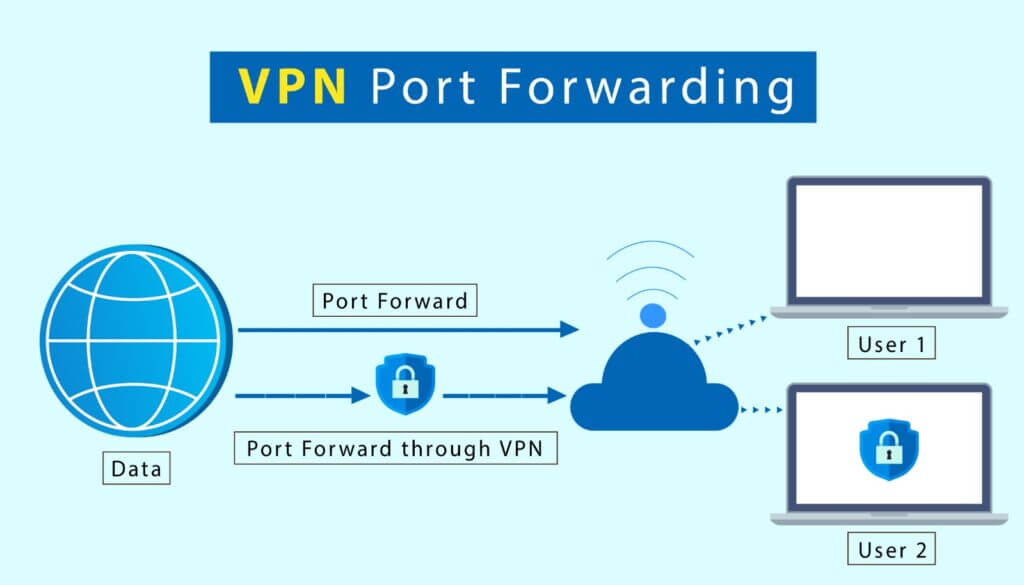How can VPN port forwarding help with torrenting?
One of the most common uses of VPNs is torrenting. This is because VPNs mask users’ identity when connected to the Internet, allowing them to stay anonymous when online, which is important when using torrenting software.
Using VPN port forwarding technology can benefit you if you are using VPNs to torrent data files. Here’s how.
What is VPN Port Forwarding?
In the context of the Internet, a port is a number that refers to online data transmission and is responsible for routing different types of data to the correct destinations. Port forwarding is the process of changing ports between different computing devices.
Ordinarily, when accessing the Internet, data packets sent by your device will include port numbers to ensure that the data reaches the correct location. For example, FTP (File Transfer Protocol) requests are handled by port 21.
When port forwarding is enabled, a signal interception process is added that changes the port number for added security, improved download speeds, and other benefits. This is accomplished by mapping an external IP address and port number to an internal IP address and port number.
Port forwarding is generally separated into two types: dynamic and static. Static port forwarding uses the same port number for all forwarding requests, while dynamic port forwarding changes port numbers for each request.
Static port forwarding is ideal for torrenting because it allows you to use the same port number each time you connect to your torrenting software. Using dynamic port forwarding will require you to change your settings each time you connect to the Internet.
One advantage of dynamic port forwarding is that it allows users to cycle through ports that are not in use. This may be appealing to you in some situations, though it may not be best for you for general VPN use or torrenting due to the extra work required when connecting to your torrenting client.
Note that many VPNs don’t offer port forwarding because they perceive it as a security risk. VPNs typically use their own firewalls to protect their customers from connections that could compromise their privacy. Port forwarding allows users to bypass firewalls and thus many VPNs don’t include it as a feature. VPNs that offer port forwarding include NordVPN and Surfshark.
Advantages of Torrenting with VPN Port Forwarding
One of the primary benefits of using a VPN for torrenting is increased privacy and security. When you connect to a VPN server, all of your Internet traffic is routed through an encrypted tunnel, which makes it much more difficult for anyone to spy on your online activity or steal your personal information.
Using a VPN with port forwarding can help you hide your IP address while torrenting. Your IP address is a unique identifier that is used to identify your device on the Internet. When you torrent, your IP address is visible to other users in the swarm, which can expose you to privacy and security risks.
With a VPN, your IP address is hidden behind the VPN server, which makes it much more difficult for anyone to spy on your online activity or steal your personal information. This is especially important when torrenting given the nature of some websites that host torrent files.
VPN port forwarding can also help you avoid firewalls. Many organizations and institutions use firewalls to block incoming connections from the Internet, which can prevent you from accessing torrents or other P2P networks.
With VPN port forwarding, you can redirect incoming connections to a device that is outside of the firewall, which allows you to bypass these restrictions and access torrents more freely. If your only Internet access is through a firewalled network, VPN port forwarding is a powerful tool when torrenting.
With VPN port forwarding, the encrypted tunnel is extended to include incoming connections from other torrent users, which makes it even more difficult for outside parties to monitor or interfere with your torrenting activities.
Another advantage of VPN port forwarding for torrenting is improved performance. When you download a torrent file, you are connecting to a network of other users who are also downloading the same file.
Unfortunately, many ISPs (Internet service providers) throttle or block torrent traffic to reduce network congestion or prevent copyright infringement. When you use a VPN, your Internet traffic is routed through a different network, which can bypass these restrictions and improve your torrent performance.
With VPN port forwarding, you can further optimize your torrent performance by ensuring that incoming connections are directed to the device with the best upload speed.
Finally, using VPN port forwarding can increase your download speed in other ways. Some torrent sites will throttle your download speed unless you are contributing to the upload rate. This can be difficult or risky to do without a VPN since you will be exposing your device to the wider Internet. If your ISP is blocking or throttling torrents, that adds another layer of complexity.
By using VPN port forwarding, you can set up your torrenting software so that you can contribute to the upload rate of torrents that you download. This can speed up your download rate and increase the number of torrents that you can access.
VPN Port Forwarding: The Bottom Line
VPN port forwarding is a powerful tool for users who want to torrent. While it carries some risks, using port forwarding is a great way to improve your download speeds, enhance your security online, and get the most out of your VPN.
By using the guidance in this article, you’ll be able to take advantage of VPN port forwarding to enhance your torrenting experience and stay safe online!

